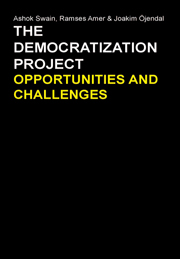Book contents
- Frontmatter
- Contents
- List of Tables
- List of Figures
- Acknowledgements
- Contributors
- The Democratization Project: Opportunities and Challenges
- 1 The Democratization Project: Peace, Conflict and Development
- 2 Non-Authorized Military Interventions and Legitimization by the United Nations
- 3 From Condemnation to Legitimization of Outcome: The United Nations and the Use of Force in Inter-State Relations
- 4 Demos or Deus: Patterns of Religious Dimensions in Asian Armed Conflicts, 1945–2005
- 5 The Left and Democratic Consolidation – Deepening Democracy in Latin America?
- 6 Democracy without People? – The Risk of Monopolizing the Democratization Project
- 7 The Role of Hamas in Building Palestinian Democracy in the Midst of Violence
- 8 Elections and Violence in Sri Lanka: Understanding Variation Across Three Parliamentary Elections
- 9 Post-Accord Elections and Armed Conflict
- 10 Peace Through Democracy? The Challenges of Postwar Democratization in Weak and War-Torn States
6 - Democracy without People? – The Risk of Monopolizing the Democratization Project
Published online by Cambridge University Press: 05 March 2012
- Frontmatter
- Contents
- List of Tables
- List of Figures
- Acknowledgements
- Contributors
- The Democratization Project: Opportunities and Challenges
- 1 The Democratization Project: Peace, Conflict and Development
- 2 Non-Authorized Military Interventions and Legitimization by the United Nations
- 3 From Condemnation to Legitimization of Outcome: The United Nations and the Use of Force in Inter-State Relations
- 4 Demos or Deus: Patterns of Religious Dimensions in Asian Armed Conflicts, 1945–2005
- 5 The Left and Democratic Consolidation – Deepening Democracy in Latin America?
- 6 Democracy without People? – The Risk of Monopolizing the Democratization Project
- 7 The Role of Hamas in Building Palestinian Democracy in the Midst of Violence
- 8 Elections and Violence in Sri Lanka: Understanding Variation Across Three Parliamentary Elections
- 9 Post-Accord Elections and Armed Conflict
- 10 Peace Through Democracy? The Challenges of Postwar Democratization in Weak and War-Torn States
Summary
In Latin America, there is disappointment with the current democratization project because of its limited definition, and the appropriation of the concept of citizenship by dominant sectors. Democracy is understood to be a partial and very specific form of government that functions under the most basic concept of representation based on one person, one vote. This approach focusses almost exclusively on political parties alternating in office and leaving aside questions of real participation and ways to reduce social inequalities.1 The democratization project has been reduced, therefore, to ‘formal democracy’ that guarantees electoral processes in particular fair and competitive elections to renew political representatives at each election. This democracy project has enormously benefited the political elite, especially political parties, which have monopolized the political process and have resisted changing the status quo.
In the 1980s and 1990s, the so-called ‘third wave of democratization’ brought to the region a new citizenship regime which emphasized individual liberties and universal suffrage. Hence, democratic regimes have extended political and civil rights while social and economic rights have been under attack (or dismissed) as governments prioritize fiscal balance over social policy.
Consequently in Latin America, there have been some institutional reforms and more ‘transparency’ in its public affairs. However, the fundamental structures of inequality and the vertical controls over society remain untouched, making a viable democracy unlikely for ordinary people. Moreover, there is a disconnection between voting and the conditions of peoples’ lives.
- Type
- Chapter
- Information
- The Democratization ProjectOpportunities and Challenges, pp. 105 - 112Publisher: Anthem PressPrint publication year: 2009

